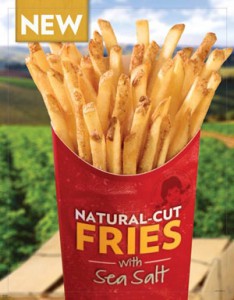Wendy’s Battles for French Fry Crown, May Only Get False Advertising Lawsuit
Fast food junkies around the country rejoice, for a new king of french fries has apparently been crowned. According to Wendy’s website anyway.
Yes, the red-headed fast food giant made waves in the fast food world last week when the company called out current reigning champ McDonalds in their new set of commercials. What Wendy’s claims in its ads can be considered blasphemy to devout burger eaters, because the company asserts that their new Natural Cut French Fries taste better than those at the Golden Arches.
 These are pretty tough words to back up, as I’m sure most people would considered McDonalds’s fries to be a crowning achievement when it comes to fast food. However, Wendy’s supports its claims by touting the results of a blind taste test conducted by an independent research company it hired. The report’s results found that 56 percent of consumers preferred Wendy’s new fries over McDonalds, which only received 39 percent of the votes.
These are pretty tough words to back up, as I’m sure most people would considered McDonalds’s fries to be a crowning achievement when it comes to fast food. However, Wendy’s supports its claims by touting the results of a blind taste test conducted by an independent research company it hired. The report’s results found that 56 percent of consumers preferred Wendy’s new fries over McDonalds, which only received 39 percent of the votes.
Now fries with great flavor are all well and good, but the problem some people are having with Wendy’s new line of fries is the company’s use of the word “natural.” The blogosphere has been lit up as of late over this topic. In advertising its new fries which debuted last November, Wendy’s asserts that it developed the recipe in an attempt to better cater to the tastes of its consumers. The company determined that by leaving the potato skins on their fries and using sea salt instead of the usual iodized table stuff, they were able to create a crispier tastier and more natural-looking fry.
Wendy’s new fries certainly do look better than last year’s model, but the problem as one blogger points out is that they’re not all that natural. The reason is because after the fries are cut, they still go through a chemical bath of sodium acid pyrophosphate and dextrose, which are designed to keep the fries from browning after they’re fried a second time at the restaurant. The oil used to cook the fries also has an equally long and unnatural sounding chemical added to it in order prevent the oil from getting foamy.
The result is that Wendy’s new fries are essentially more of the same old thing, only covered in potato skin and sea salt. And to some, this has led to speculations over a potential new class action against the company because the fries aren’t as natural as Wendy’s claims them to be.
Sounds crazy, right? If you nodded in agreement, you’d be right.
Now it’s pretty obvious by Wendy’s throwing the word “natural” into the name of its new fries and loading its new ads with images of grassy fields and farmland, that the company wants to jump on the organic food wagon or at least make their customers think they have. Some would say that this is all very misleading as some consumers may actually start to believe that Wendy’s fries are organic and start to buy them based upon this belief. However, such a misinterpretation alone is not nearly enough of a basis for a false advertising class action.
The case law for false advertising is pretty clear under federal and most state laws. The standard is generally that an advertisement must either literally be false or likely to mislead consumers. Wendy’s new ad campaign for its fries hardly meets the “literally false” standard at all because for one, the company never actually asserts their fries are organic, and for that matter, that the fries are even natural. The official product name is “Natural Cut French Fries,” not “Natural French Fries.” The word “cut” tells you that the fries are just simply cut into fries without the usually peeling first and definitely doesn’t conjure the belief that they are natural or organic. Even the boarder “likely to mislead” standard isn’t met either because all the company ever says about its fries is that they taste better than before and that more consumers prefer their brand over their competitor’s, which they support with a blind taste test.
Wendy’s never claims their fries to be anything more than just tasting good. And that’s the genius behind these ads. You see, rather than just go the misleading route like most companies do, Wendy’s has gone the subliminal route with it ads. They used natural looking scenery and images to promote their new product which in turn has a chance of subtly implanting the notion in consumers that the company’s fries are natural and perhaps even healthy.
Some might say that even if this were Wendy’s intent, the advertising would still be misleading. However even so, almost every major company out there uses this advertising tactic and if Wendy’s goes down, you’d better believe that the litigation flood gates would be open to every single one of those other companies, too. And as unfair as something like this might sound, the fact of the matter is that puffing up ads has long been acceptable in the eyes of the law.
So what can you learn from all this? Well, if you’re a consumer, you can pretty much rest assured that fries are still bad for you. And if you’re a business owner looking to puff up your products without the FTC or private individuals suing you, than take a page from Wendy’s advertising playbook and go subliminal.

Comments